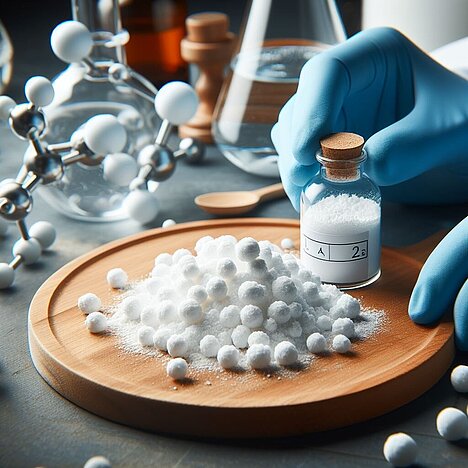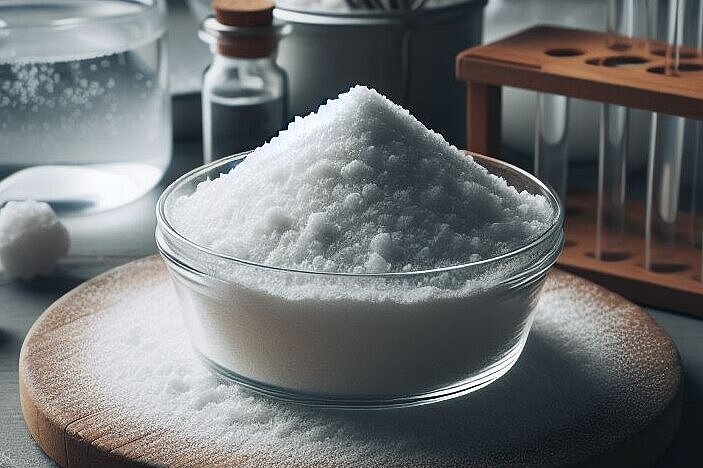Ammonium carbonate

What is ammonium carbonate?
Ammonium carbonate is a salt consisting of ammonium and carbonate ions. It has the chemical formula (NH4)2CO3 and forms colorless, cubic crystals. Ammonium carbonate is soluble in water and reacts slightly alkaline in aqueous solution. The pH value of a 10% solution is 9.4.
Ammonium carbonate decomposes slowly in air and violently when heated. This produces ammonia, carbon dioxide and water. Decomposition begins at temperatures as low as 58 °C. This makes ammonium carbonate a suitable leavening agent, as it releases carbon dioxide in the oven, which loosens the dough. It also gives the baked goods a typical "sour" taste due to the remaining ammonia.
How is ammonium carbonate produced?
Ammonium carbonate can be produced in various ways. One possibility is the reaction of carbon dioxide with ammonia in an aqueous solution. Another possibility is to heat calcium carbonate together with ammonium sulphate. In addition to ammonium carbonate, ammonium hydrogen carbonate and ammonium carbamate also sublime, while calcium sulphate remains as a solid.
Ammonium carbonate is generally approved for use in foodstuffs and bears the European approval number E 503i. It can also be used for the production of organic food.
What are the advantages of ammonium carbonate?
Ammonium carbonate has several advantages as a leavening agent:
- It is natural and can be derived from plant or animal sources.
- It is vegan and gluten-free.
- It has a high leavening power and can also be used for heavy doughs such as gingerbread or speculoos.
- It gives the baked goods a crispy crust and fine pores.
- It has a pleasant smell of ammonia, reminiscent of fresh bread.
What are the disadvantages of ammonium carbonate?
Ammonium carbonate also has some disadvantages as a leavening agent:
- It decomposes quickly and must therefore be stored in a cool, dry place.
- It can cause irritation to the eyes, skin or respiratory tract in sensitive people.
- It can mask the taste of other ingredients or cause undesirable discoloration.
- At high doses, it can lead to increased absorption of nitrogen, which can put a strain on the kidneys.
How does ammonium carbonate affect dogs?
Ammonium carbonate is not toxic to dogs, but it is not healthy either. It can cause similar symptoms in dogs as in humans, such as irritation, nausea or vomiting. It can also alter the pH value of the blood and lead to metabolic alkalosis, which can affect the cardiovascular system.
Therefore, dogs should not be fed cookies containing ammonium carbonate or denied access to such foods. If a dog has accidentally eaten ammonium carbonate, it should be given plenty of water to drink and a vet should be consulted if necessary.
Ammonium carbonate is a raising agent that comes from natural sources and gives baked goods a crispy crust and a leavened taste. However, it also has some disadvantages, such as a short shelf life, a possible irritant effect and a nitrogen load. Ammonium carbonate is not suitable for dogs and should be avoided.
Properties 6
Are you looking for other ingredients with a specific property?
Just click on them to find more.
If you notice any signs of hypersensitivity or poisoning in your dog, you should see your vet immediately. We are not a substitute for a vet, but we try to be as accurate as possible. Every dog reacts differently and we recommend you get a second opinion or consult your vet if in doubt.
Stay healthy and take good care of your four-legged friend!😊
Similar to Ammonium carbonate
The benefits of sodium bicarbonate for dogs Sodium bicarbonate has some positive effects for dogs due to its alkaline property. This means that it can neutralize acids. Here are some examples of how...
Cream of tartar baking powder is a leavening agent that consists of three components: Baking soda: Baking soda is a sodium salt of carbonic acid, also known as sodium bicarbonate or sodium hydrogen...
The daily requirement of pure calcium varies depending on the body weight and age of the animal. A puppy needs more calcium than an adult dog as it is still growing. A dog weighing 10 kg, for...
Potassium carbonate is a salt that is formed by the reaction of potassium hydroxide with carbon dioxide. It is soluble in water and forms an alkaline solution. Potassium carbonate is an important...



